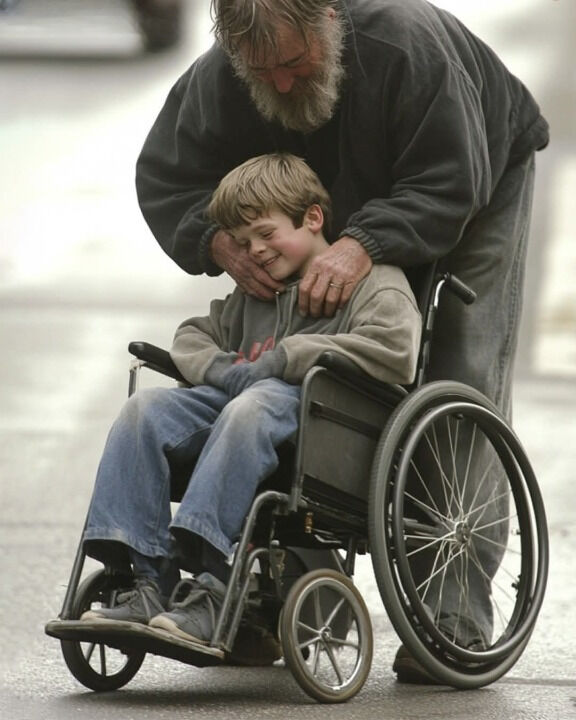
Disabled Homeless Man Gave His Wheelchair to a Boy—5 Years Later…
Five years ago, on a cold winter’s day, a homeless man named Henry sat on the corner of 5th Street with nothing but the clothes on his back and a worn-out wheelchair. Henry had lived on the streets for as long as he could remember. His body had long been ravaged by illness and poverty, and he couldn’t walk without the assistance of the wheelchair that had been his only companion for many years. Yet, despite the hardships, Henry maintained a quiet dignity, and his heart was as big as his struggles.
That day, a young boy named Eli, around 9 years old, walked by with his mother. Eli noticed Henry sitting there, shivering, his wheelchair with cracked wheels and a broken armrest. His mother quickly tugged him along, but Eli’s gaze lingered. There was something about the man that made Eli’s heart ache. Henry caught the boy’s eye and smiled, a weak but warm smile, which caused Eli to stop in his tracks.
Eli knelt down beside Henry, offering him the half-eaten sandwich he had in his hand. “Are you hungry?” Eli asked, his voice filled with genuine concern. Henry shook his head gently. “No, but thank you, little one. I’ve had enough today.” Then Eli asked him, “Why don’t you go home, sir?” Henry’s face softened as he replied, “I don’t have a home anymore. This is where I live now.”
As the day passed, Eli couldn’t stop thinking about Henry. He would return to that street corner each day after school, talking to Henry, bringing him food and warmth. Despite his own family’s struggles, Eli’s mother had taught him the importance of kindness, and every time he saw Henry, he knew he couldn’t just walk away. A bond slowly formed between the two. Eli’s presence seemed to bring Henry some comfort, and Henry’s stories gave Eli a glimpse into a world he’d never known.
One day, as winter grew colder, Eli noticed something that troubled him. Henry’s wheelchair had become even more damaged, the wheels barely turning. Henry was struggling to get around. Eli’s heart sank as he watched the old man, who had always seemed so strong, now helpless. Without hesitation, Eli ran home and dug into his savings jar—pennies he had collected from doing chores over the months. It wasn’t much, but it was all he had.
The next day, Eli came back to the corner with a brand-new wheelchair, shiny and functional. He presented it to Henry, saying, “I bought this for you. I hope it helps.” Henry’s eyes filled with tears as he took the wheelchair in his hands. “But you didn’t have to do this, Eli,” Henry said, his voice cracking. “You’re just a boy.” Eli smiled and said, “I know. But you need it more than I do.” With that, Henry slowly stood up, using the strength in his arms to lower himself into the new wheelchair. It was a moment of quiet triumph, not just for Henry, but for Eli too.
The two parted ways that day, each moved by the other’s generosity. Five years passed, and though Eli grew up and his family moved to a different neighborhood, he never forgot Henry. He had often wondered what had become of him, hoping the wheelchair had made a difference.
One afternoon, Eli, now a teenager, found himself walking near that old street corner on his way home from school. To his surprise, he saw a familiar face. There, sitting outside a small café, was Henry—except he wasn’t alone. Next to him stood a young boy, much like Eli had once been, sitting in a brand-new wheelchair, smiling up at Henry.
Eli hesitated, but then Henry noticed him. Their eyes locked, and a smile slowly spread across Henry’s face. “Eli!” he called, waving him over. As Eli approached, Henry introduced him to the boy next to him—his name was Jake, and Henry had taken him under his wing, just as he had once done with Eli. “This is Jake,” Henry said with pride. “I gave him the wheelchair you gave me. It’s his turn to help someone now.”
Eli felt a lump in his throat as he realized what had happened. Henry had done more than just survive on the streets—he had paid it forward. The kindness Eli had shown him all those years ago had lived on in Henry, who had now shared it with another child. Eli’s heart swelled with gratitude and hope. He had helped change a life, and in return, Henry had done the same for someone else.
In that moment, Eli understood that the small acts of kindness we give don’t just affect the people we directly help—they ripple through time, touching lives we might never even see. Henry had once been a homeless man on the street, but now he was a mentor, passing on the same love and care he had once received.
As the sun set that evening, Eli knew that the cycle of compassion would continue. Henry had shown him that even in the darkest of times, the light of human connection could shine through. And in that simple act of giving a wheelchair, both Eli and Henry had created a legacy of kindness that would echo for years to come.

